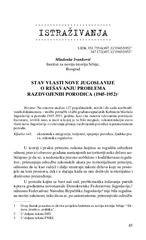Приказ основних података о документу
Stav vlasti nove Jugoslavije po pitanju rešavanja problema razdvojenih porodica (1945-1952)
Position of the Government of the New Yugoslavia on Resolving the Problems of Separated Families (1945-1952)
| dc.creator | Ivanković, Mladenka | |
| dc.date.accessioned | 2020-10-19T13:07:38Z | |
| dc.date.available | 2020-10-19T13:07:38Z | |
| dc.date.issued | 2007 | |
| dc.identifier.issn | 1451-5822 | |
| dc.identifier.uri | https://www.jevrejskadigitalnabiblioteka.rs/handle/123456789/1381 | |
| dc.identifier.uri | http://media.hereticus.org/2014/12/Hereticus-3-4-2007-FINAL.pdf | |
| dc.description.abstract | Na osnovu analize 127 pojedinačnih, novih i do sada neobraljivanih dokumenata - molbi, pritužbi i žalbi građana upućenih Kabinetu Maršala Jugoslavije u periodu 1945-1951. godine, kao i na osnovu relevantne postojeće literature, izvršili smo, u meri u kojoj je to bilo moguće, rekonstrukciju stava vlasti nove Jugoslavije o rešavanju pitanja razdvojenih porodica u posmatranom periodu. | sr |
| dc.description.abstract | On the basis of the analysis of 127 individual, new and non-processed documents (complaints, requests and citizens' appeals) submitted to the Cabinet of the Supreme Commander of Yugoslavia in the period from 1945 to 1951, as well as according to the existing literature, we made a reconstruction of the position of the government of new Yugoslavia on solving the issue of separated families in this time period. Due to the difficult economic situation, a considerable number of inhabitants left the Kingdom of Yugoslavia until the outbreak of the Second World War. Their departure was primarily motivated by economic considerations, and had as its definite result, employment in the countries of acceptance, adoption of the local citizenship, naturalization and taking up permanent residence. These economic migrants left behind their families with whom they stayed in touch, and once they had acquired real-estates and the necessary financial possibilities, they would collect the documents to bring the remaining members of their nuclear families (wives and children) to their new homeland. The way the families of the economic migrants could obtain the emigration passports was legally set down by the Law on Emigration of August 1923. The beginning of the Second World War disrupted all spheres of human life, including further emigration aimed at bringing families together. Once the war was over, it seemed the conditions for the process of reuniting families, which had been interrupted by the war, were propitious. However, the matter of issuing passports in the period under review was not regulated by new laws of the newly constituted Democratic Federal Yugoslavia, i.e. the Federal People’s Republic of Yugoslavia, so by default and in keeping with the usual theory and practice of law application, (which stipulate that lacking the newer legally defined and codified legislation the legal acts according to territorial principle are to be applied, i.e. that the existing laws of states which had existed in a given territory should be observed as binding, even though these states had experienced territorial and social reform) the existing legal stipulations of the pre-war time were applied. As regards the possibility of enjoying the right to obtain a passport for leaving Yugoslavia with the aim of uniting with one’s family in the period under scrutiny, we can distinguish three periods. The most propitious period for acquiring passports was during the functioning of the temporary government of Democratic Federal Yugoslavia, at the time armed activities had ceased. Comparatively propitious period was the one until May 1951. The supreme Communist Party organ of the new Yugoslavia issued a decree on the way the passport applications of the families of economic migrants were to be handled. This decree had the de facto force of law. Immediately after passing the decree, the Departments of Passports and Border Service of Ministries of the Interior of all republics were sent a circular letter dealing with the way applications for the above-mentioned passports were to be handled. The circular letter was meant only for internal use and in some cases, it perceptibly limited the rights foreseen by the Decree. | en |
| dc.language.iso | sr | sr |
| dc.publisher | Beograd : Centar za unapređivanje pravnih studija | sr |
| dc.relation | info:eu-repo/grantAgreement/MESTD/MPN2006-2010/147043/RS// | sr |
| dc.rights | openAccess | sr |
| dc.rights.uri | https://creativecommons.org/licenses/by-nc-nd/4.0/ | |
| dc.source | Hereticus : časopis za preispitivanje prošlosti | sr |
| dc.subject | emigracija, ekonomska | sr |
| dc.subject | immigration, economic | sr |
| dc.subject | iseljenici | sr |
| dc.subject | immigrants | sr |
| dc.subject | spajanje porodica | sr |
| dc.subject | family reunification | sr |
| dc.subject | ljudska prava | sr |
| dc.subject | human rights | sr |
| dc.title | Stav vlasti nove Jugoslavije po pitanju rešavanja problema razdvojenih porodica (1945-1952) | sr |
| dc.title | Position of the Government of the New Yugoslavia on Resolving the Problems of Separated Families (1945-1952) | en |
| dc.type | article | sr |
| dc.rights.license | BY-NC-ND | sr |
| dcterms.abstract | Иванковић, Младенка; Став власти нове Југославије по питању решавања проблема раздвојених породица (1945-1952); Став власти нове Југославије по питању решавања проблема раздвојених породица (1945-1952); | |
| dc.rights.holder | Centar za unapređivanje pravnih studija | sr |
| dc.identifier.fulltext | http://jevrejskadigitalnabiblioteka.rs/bitstream/id/4311/StavVlastiOCR.pdf | |
| dc.type.version | publishedVersion | sr |
| dc.citation.spage | 85 | |
| dc.citation.epage | 101 | |
| dc.citation.issue | 3-4 | |
| dc.identifier.rcub | https://hdl.handle.net/21.15107/rcub_jdb_1381 |

